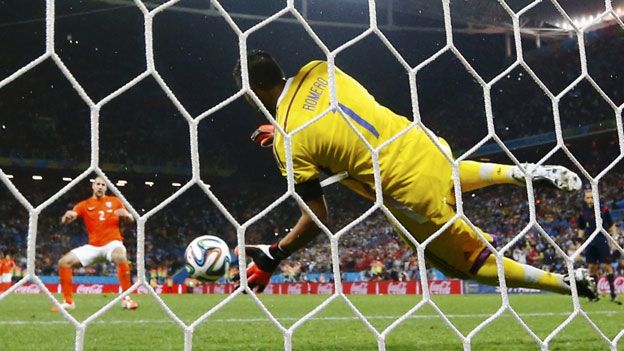When do footballers reach their peak?
- Published

It's often said that footballers are at their peak between the ages of 27 and 29 and World Cup stats provide a startling confirmation.
Historically, the perfect age to be a player in the World Cup is 27.5.
That's the average age of the winning teams in the 19 World Cup finals from 1930 to 2010, from the youngest - Argentina in 1978 (25.7) - to the oldest - Brazil in 1962 (30.7).
Interestingly, this figure, 27.5, also jumps out of the stats from the 2014 World Cup in Brazil. It's the mean age of the 32 teams that played in the first group matches.
The median age is also very close - if you list all 32 teams in order of age from the youngest (Nigeria, 24.4) to the oldest (USA, 29.5), the two teams in the middle of the table (England and Australia) both have an average age of 27.4.
In all cases we have taken the starting line-up of 11 players, ignoring substitutions.
Does this suggest that the perfect age to be a footballer is 27.5? Or that the German team, whose starting line-up in the semi-final had an average age of 27.7, is likely to beat Argentina, whose starting 11 averaged 28.4?
Well, maybe not. Consider Wednesday's semi-final. Argentina beat a team whose starting 11 had an average age of exactly 27.5 - the Netherlands.
Two other conclusions can be drawn from these figures.
One is that the headlines about Roy Hodgson picking a very "young" England side for Brazil 2014 were misleading. England's average age was 27.4, which - as mentioned above - is the median age in this competition. (And incidentally the England team's starting 11 in the 1966 World Cup final was a lot younger, averaging 26.7.)
We can also dismiss the idea, widely bandied about on the eve of the competition, that Spain's team was too old to retain the trophy it won in 2010. Spain's average age in its first group match was 28.7 - the same as Argentina's in its first group match.
And note that Argentina beat four of the 10 youngest sides in the competition to reach the semi-finals: Bosnia-Herzegovina (26.7); Nigeria (24.4); Switzerland (26.6); Belgium (25.8). (Again, these numbers are the average age of the starting 11 of the first group match.)
It's also worth mentioning that Brazil's 1958 World Cup winning team was one of the youngest (26.3) but their 1962 winning team was the oldest by a long way (30.7). The huge difference in average age is explained by the fact that eight of the team that started in the 1958 final also started in 1962 - which proves that the age of a side is irrelevant if it's simply incredibly talented.